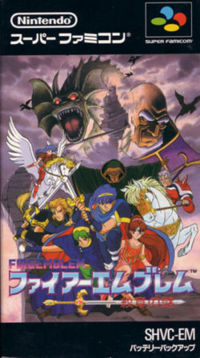Fire Emblem: Monshou no Nazo

| |
| Fire Emblem: Monshō no Nazo | |
| Developer | Intelligent Systems |
| Publisher | Nintendo |
| System | Super Nintendo Virtual Console |
| Release Date | Super Nintendo' JP January 21, 1994 Virtual Console JP December 26, 2006 |
| Gallery | GH Gallery |
Fire Emblem: Monshō no Nazo (which translates to Fire Emblem: Mystery of the Emblem) is the third game in the Fire Emblem series and the first to be released over the Super Nintendo. It is divided into two halves, the first being a remake of the original Fire Emblem game while the second half acts as a direct sequel to it.
Story
Book 1 is the same as the story of the first game in that exiled prince of Altea, Marth must lead a group of rebels to defeat the evil Garnef, who seeks to resurrect the dark dragon Medeus.
Book 2 is set several years later. In it, Marth is living happily and preparing for marriage when he is called in to suppress a rebellion within the Holy Empire of Akaneia, ruled by Marth's good friend Hardin. However, Marth soon comes across a conspiracy which threatens to change his relationship with Hardin forever, and giving him a new enemy in the process.
Gameplay
The gameplay was mostly similar to the previous game in that the player moved units across the gridded maps like pieces on a chessboard, with each unit having unique movement range as well as different abilities/weapons and weaknesses. Some tweaks include certain characters having Support bonuses when near each other, the ability to mount and dismount horses and modification of how the dragonstones worked.
Legacy
Sequels
The next Fire Emblem game to be released was Fire Emblem: Seisen no Keifu, which was the first game to be set in a new continuity. There has yet to be another game taking place in Akaneia with the exception of Fire Emblem DS, which is also a remake of Ankoku Ryuu to Hikari no Tsurugi.
Ports and Remakes
- It was released for the Japanese Virtual Console in December 2006. A demo for the game was also included in the Japanese version of Super Smash Bros. Brawl as one of the Masterpieces.
| Titles in the Fire Emblem Series |
|---|
| Shadow Dragon & The Blade of Light (DS) - Gaiden (Echoes) - Monshou no Nazo (DS) - Seisen no Keifu - Thracia 766 Fuuin no Tsurugi - Fire Emblem - The Sacred Stones - Path of Radiance - Radiant Dawn Awakening - Fates - Three Houses - Engage Tokyo Mirage Sessions #FE - Heroes - Warriors (Three Hopes) |